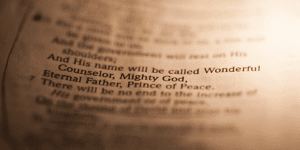By Carey Dean All humanity enters this world as a son or daughter. The deepest part of our soul longs to know and be known by our Creator. Inside our…
“For to us a child is born, to us a son is given, and the government will be on his shoulders. And he will be called Wonderful Counselor, Mighty God, Everlasting Father, Prince of…
Christmas is a season of awe. It’s a time when we celebrate God’s extravagant display of grace, humility, and wisdom that runs contrary to conventional thinking: the King of Kings…
Every year my parents would gather our family together, and each night for about a week we would quote, from memory, the Christmas story found in Luke 2. You see,…
“Honor your father and your mother, so that you may live long in the land the Lord your God is giving you.” (Exodus 20:12) “Honor your father and your mother, as the Lord your God has commanded you, so…
This past week I have been working on the next article in my series on the Ten Commandments. This week it’s the fifth commandment, “Honor your father and your mother.” As I’ve been reading, researching, and praying in preparation to write that article, it brought to my mind the years my sister and I cared for our mother in our home.
“Remember the Sabbath day by keeping it holy. Six days you shall labor and do all your work, but the seventh day is a sabbath to the Lord your God. On it you shall not do…
“You shall not misuse the name of the Lord your God, for the Lord will not hold anyone guiltless who misuses his name” (Exodus 20:7; Deuteronomy 5:11). Let’s look further at the phrase: Don’t…
“You shall not make for yourself an image in the form of anything in heaven above or on the earth beneath or in the waters below. You shall not bow down to…
In the first commandment, God forbad the recognition of any other god. Basically He told them, “I’m your God, not only because I chose you to be mine, but because in reality there are no other gods. Not even one.”
Now, God goes a step further and told His people that they were not to give the worship due to Him to any other thing—anything in heaven, in earth, or in the ocean depths. Nothing made (e.g., a wooden idol), nothing imagined (the power of the sun, moon, stars), nothing experienced (feelings, external forces), nothing natural (trees, rocks, gems) were to take His place as our object of worship.













